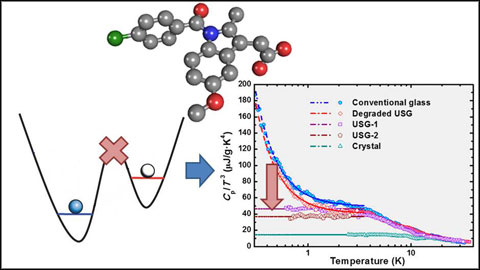Surprising properties discovered in a new type of glass

08/07/2014
Glasses are disordered solids usually obtained by supercooling a liquid bypassing crystallisation. A remarkable feature of glass is that, independently of its nature and composition, it exhibits a series of common properties, known as universal properties, in the low-temperature range. In this case, the specific heat is characterised by a linear term below one kelvin, in comparison to the cubic behaviour of crystalline solids. This excess is ascribed to a process of quantum tunneling between two states of similar energy, but without any direct interaction. This model, known by the name of 'Two Level Systems' or TLS, is widely accepted today, although it does have some detractors, such as Nobel Prize winner in Physics, Dr A.J. Legget, who upholds that it is highly improbable for these types of non-interacting systems to give way to such universal properties.
In a collaboration between Cristian Rodríguez Tinoco and Javier Rodríguez Viejo, researchers from the Department of Physics of the UAB (UAB-MATGAS) and Tomás Pérez Castañeda and Miguel Ángel Ramos, from the Department of Physics of Condensed Matter of the UAM, it was demonstrated that a new type of ultrastable glass from an organic molecule named indomethacin does not have a two level system, and thus breaks the universality of this property. At the same time, this project sheds light on the microscopic origin of two level systems, by attributing its absence to a lower interaction between indomethacin molecules in ultrastable glass.
It must be highlighted that ultrastable glass represents one of the newest and most intriguing recent developments in materials science. This new family of glass possesses a thermodynamic and kinetic stability much superior to that of conventional glass, commonly obtained from liquid. The new type of glass is prepared in a fine layered structure after the steam phase, and in a few hours scientists can create materials with such a high level of stability that it would take millions of years to created them using conventional techniques. And for this reason they receive the name of ultrastable. This type of glass, discovered in 2007 by Professor Ediger's research group at the University of Wisconsin-Madison, is today the object of intense scientific activity. It possesses properties that are different form other types of glasses, such as more elevated glass transition temperatures, less water absorption, less aging caused by thermal treatments, improved mechanical properties and many more advantages which make it of interest in new applications. They are also considered to be a key element in unraveling some of the current enigmas of the state of glass, such as the possible existence of a primary transition phase which is masked by the sudden termination of the translational movement of molecules due to a decrease in temperature.
Original article:
"Suppression of tunneling two-level systems in ultrastable glasses of indomethacin"
Tomás Pérez-Castañeda, Cristian Rodríguez-Tinoco, Javier Rodríguez-Viejo, and Miguel A. Ramos. PNAS 2014; published ahead of print July 7, 2014, doi:10.1073/pnas.1405545111